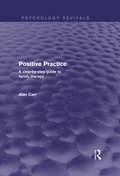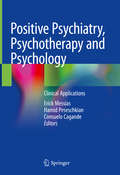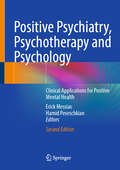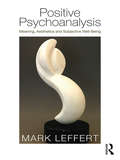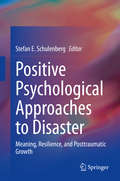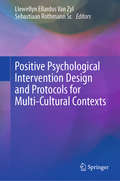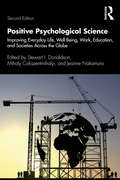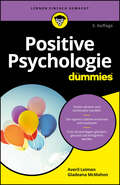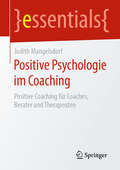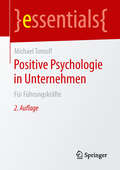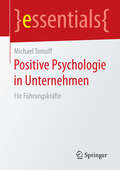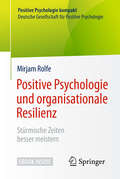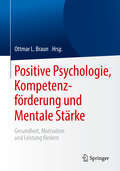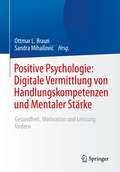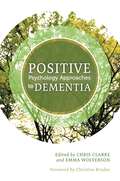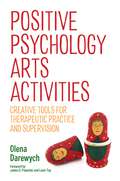- Table View
- List View
Positive Practice: A Step-by-Step Guide to Family Therapy (Psychology Revivals)
by Alan CarrOriginally published in 1995 Positive Practice is for newcomers to the field of family therapy and systemic consultation including professionals from a variety of disciplines, such as psychology, psychiatry, social work, nursing, child care and protection, occupational therapy, paediatrics and general medical practice. Positive Practice is a step-by-step approach to family therapy written both as a treatment manual and as a training resource. It describes in detail a unique approach to consulting to families with youngsters who have psychological or social problems. It covers the difficulties associated with planning the first consultation, strategies for family assessment and problem formulation, methods for developing a therapeutic contract and goal setting, plans for conducting therapy and troubleshooting resistance, and ways of concluding therapy. It includes many diagrams and checklists and is essentially jargon-free. Practical exercises are given at the end of each chapter, making it an ideal training resource for any introductory course. Special issues discussed include adjunctive individual sessions, convening network meetings, jointly managing statutory and therapeutic responsibilities, ethical decision making, clinical audit and professional development. An integrative formulation model provides a focus for both guiding assessment and planning therapy. The approach to practice described in this book offers clinicians a way to integrate new ideas from the burgeoning literature on family therapy, theory and research into their clinical work.
Positive Psychiatry, Psychotherapy and Psychology: Clinical Applications
by Erick Messias Hamid Peseschkian Consuelo CagandeFor hundreds of years, psychology has looked into the dysfunctions and symptoms of the mind. It’s only over the last few decades that the field has started to pay attention to what constitutes a functional and content life. Instead of using disease to understand health, positive psychology studies the components of a good life and helps people not only avoid mental health problems but develop happiness. The work done in positive psychology is now at a point where applications are being developed in positive psychotherapy and extended to those with psychiatric diagnoses in positive psychiatry. While these fields are a recent development they hold the promise of helping all of us live a fulfilled life. Medicine in general, and psychiatry in particular, suffers from a worldview that is symptom- and deficit-oriented. By adopting a positive approach, psychology, psychotherapy, and psychiatry add a more holistic, integrative, resource oriented, and preventive perspective. There is great urgency in developing resources and potentials in our patients, not only freeing them from their disorders. Psychiatrists and psychotherapists alike are incorporating these positive tools into their practices with positive clinical outcomes. Standing on the shoulders of pioneers like Nossrat Peseschkian, in positive psychotherapy, and Dilip Jeste, in positive psychiatry, this textbook is the first to bring together these innovations in one volume that will serve as an excellent resource for medical professionals looking to reap the benefits gained by the studies in these areas. Currently, the majority of texts that are available are targeting psychologists and researchers, whereas this book seeks to use positive psychology as the foundation on which the clinical applications are built. As such, this book will be of interest to psychiatrists, psychologists, social workers, and other mental health professionals. It may be used in educating a new generation of mental health professionals in these tenets that are expanding the reach of psychology, the practice of psychotherapy, and the scope of psychiatry.
Positive Psychiatry, Psychotherapy and Psychology: Clinical Applications for Positive Mental Health
by Erick Messias Hamid PeseschkianThis book offers a holistic, integrative, resource oriented, and preventive perspective on psychotherapy, psychiatry, and psychology. There is great urgency in developing resources and potential in our patients, not only in freeing them from their disorders. Pandemics, wars, international terrorism, climate catastrophes, escalating nationalism in numerous countries, economic crises, a pervasive distrust of governments, institutions, and even fellow citizens, along with a surge in addictive behavior towards social media, just to name a few major factors, have contributed to a notable increase in mental disorders, the prescription of psychotropic drugs, suicidality, loneliness, and depression. The fully revised and expanded second edition brings together 76 authors from 19 countries and 5 continents, who collectively share their experiences in the clinical application of positive mental health across more than 55 chapters. Twenty-two new chapters have been added, addressing emerging topics and contemporary issues. These include insights into practicing psychotherapy in Ukraine and Ethiopia, countries deeply affected by wars; multiple chapters dedicated to trauma; the Chinese perspective on navigating the Covid-19 pandemic and its effects; understanding the LGBTQ+ community; the experience of online therapy since the outbreak of the Covid-19 pandemic; and exploration of disorders such as autism, chronic pain, death and grieving, and suicide. All authors are practicing psychotherapists in their respective countries, providing firsthand accounts from their daily experiences. Additionally, all 34 chapters from the first edition have been thoroughly updated to ensure the content remains current and relevant. It remains the only international textbook which brings together positive psychiatry, positive psychotherapy, and positive psychology. Positive Psychiatry, Psychotherapy and Psychology: Clinical Applications for Positive Mental Health will be of interest to psychiatrists, psychotherapists, psychologists, social workers, and other mental health professionals. It may be used in educating a new generation of mental health professionals in these tenets that are expanding the reach of psychology, the practice of psychotherapy, and the scope of psychiatry.
Positive Psychoanalysis: Meaning, Aesthetics and Subjective Well-Being
by Mark LeffertPsychoanalysis and Psychotherapy have, in one way or another, focused on the amelioration of the negative. This has only done half the job; the other half being to actively bring Positive Experience into patients’ lives. Positive Psychoanalysis moves away from this traditional focus on negative experience and problems, and instead looks at what makes for a positive life experience, bringing a new clinical piece to what psychoanalysts do: Positive Psychoanalysis and the interdisciplinary theory and research behind it. The envelope of functions entailed in Positive Psychoanalysis is an area of Being described as Subjective Well-Being. This book identifies three particular areas of function encompassed by SWB: Personal Meaning, Aesthetics, and Desire. Mark Leffert looks at the importance of these factors in our positive experiences in everyday life, and how they are manifested in clinical psychoanalytic work. These domains of Being form the basis of chapters, each comprising an interdisciplinary discussion integrating many strands of research and argument. Leffert discusses how the areas interact with each other and how they come to bear on the care, healing, and cure that are the usual subjects of psychoanalytic treatment. He also explores how they can be represented in contemporary psychoanalytic theory. This novel work discusses and integrates research findings, phenomenology, and psychoanalytic thought that have not yet been considered together. It seeks to inform readers about these subjects and demonstrates, with clinical examples, how to incorporate them into their clinical work with the negative, helping patients not just to heal the negative but also move into essential positive aspects of living: a sense of personal meaning, aesthetic competence, and becoming a desiring being that experiences Subjective Well-Being. Drawing on ideas from across neuroscience, philosophy, and social and culture studies, this book sets out a new agenda for covering the positive in psychoanalysis. Positive Psychoanalysis will appeal to psychoanalysts and psychotherapists, neuroscientists and philosophers, as well as academics across these fields and in psychiatry, comparative literature, and literature and the mind.
Positive Psychological Approaches to Disaster: Meaning, Resilience, and Posttraumatic Growth
by Stefan E. SchulenbergWritten by prominent proponents of disaster mental health and/or positive psychology, this comprehensive book examines disaster mental health and positive psychology in the context of natural and technological disasters. Chapters in the first section focus on applications of meaning and resilience in the area of disaster mental health, both serving as primary examples of applications of positive psychology and related frameworks. Later chapters focus more specifically on key aspects of disaster mental health, including the importance of preparedness, training, and special populations. Contributors consistently align their insights with positive psychological approaches, either by explicitly referencing their relevance or alluding less directly to themes in positive psychology.Among the topics discussed:The role of religion and spirituality in finding meaning after disastersVeterans and disaster response workFirefighters: an occupational case study of resilienceStrategies for responding to adolescents following natural and technological disastersEffective crisis response for facilitating posttraumatic growthPositive Psychological Approaches to Disaster: Meaning, Resilience, and Posttraumatic Growth is a significant and timely collection of research, representing an effort of internationally respected scholars in positive psychology and disaster mental health.
Positive Psychological Intervention Design and Protocols for Multi-Cultural Contexts
by Llewellyn Ellardus Van Zyl Sebastiaan RothmannThis volume presents innovative and contemporary methodologies and intervention protocols for the enhancement of positive psychological attributes in multicultural professional and organizational contexts. Most methods, models and approaches that underpin positive psychological interventions are confined to clinical samples, closed systems or monocultural contexts, which restrict their applicability to particular contexts. Extensive practical intervention protocols, designs and methods which usually accompany first draft intervention papers are condensed into brief paragraphs in final manuscripts or removed in their entirety. This, in turn, reduces their potential for replicability or adoption by consumers, practitioners, or industry. This volume develops guidelines for enhancing positive psychological attributes, such as positive moods (e.g. positive affect; life satisfaction), strengths (e.g. gratitude; humour), cognitions (e.g. hope; optimism) and behaviours (e.g. emotional regulation; positive relationship building) within various multicultural contexts. Thereby, it shows how positive psychology interventions can be replicated to a wide-range of contexts beyond those in which they were developed.
Positive Psychological Science: Improving Everyday Life, Health, Work, Education, and Societies Across the Globe (Applied Psychology Series)
by Mihaly Csikszentmihalyi Stewart I. Donaldson Jeanne NakamuraPositive psychological science has experienced extraordinary growth over the past two decades. Research in this area is revealing new strategies and interventions for improving everyday life, health and well-being, work, education, and societies across the globe. Contributions from luminaries in the field provide excellent reviews of the selected topics, summarizing empirical evidence, describing measurement tools, and offering recommendations for improving several aspects of life. Comprehensively updated, this second edition not only incorporates the more recent empirical findings, three new chapters on relationships and love, the importance of purpose and the stimulation of education practice have been added. Focused on peer-reviewed and theory-driven psychological science, this book uniquely establishes a bridge between the intellectual movement for positive psychology and how it works in the real world. This collection of chapters will inspire the reader to creatively find new opportunities to better the human condition, whether these are in our lives, schools, health care settings or workplaces. This book will be of interest to all psychologists and social scientists, applied researchers, program designers and evaluators, educators, leaders, students, and anyone interested in applying the science of positive psychology to improve everyday life, and/or to promote social betterment and justice locally and globally.
Positive Psychologie - Erfolgsgarant oder Schönmalerei?
by Michael TomoffPositive Psychologie - Erfolgsgarant oder Schönmalerei? Entdecken Sie die Doppelkante der Positiven Psychologie: Ein Schlüssel zu mehr persönlichem und beruflichem Erfolg oder doch nur eine rosarote Brille? Diplom-Psychologe Michael Tomoff entführt Sie in eine Welt, die sowohl die glänzenden als auch die schattigen Seiten dieser bewegenden Wissenschaft beleuchtet. Das vorliegende Buch ist weit mehr als ein Glücksratgeber. Es ist eine fundierte, kritische und dennoch humorvolle Untersuchung der Positiven Psychologie, die sich sowohl an Lehrer, Eltern, Führungskräfte, Mitarbeiter, Coaches und auch Trainer richtet – egal ob Laien oder Experten. Mit einem klaren Blick auf die wissenschaftliche Basis und die praktische Anwendung beleuchtet der Autor die Mythen und Missverständnisse rund um die Wissenschaft des Wohlbefindens: Macht Geld glücklich? Sind Eltern zufriedener als Kinderlose? Welche Rolle spielen Schuld und Scham bei der Kindererziehung? Wie kann die Positive Psychologie die Schule oder das Unternehmen von morgen unterstützen und formen? Und sollte sie das überhaupt? Durch die elegante, mundgerechte Zusammenfassung aktueller Forschungen, die Vorstellung leicht umsetzbarer Übungen, Tools und Interventionen sowie die Erörterung der Relevanz der Positiven Psychologie in verschiedenen Kulturen und Lebensbereichen bietet dieses Buch einen umfassenden Überblick und praktische Anleitungen. Erfahren Sie, wie die Positive Psychologie in Schulen, Unternehmen und im persönlichen Leben konkret Anwendung finden kann, und welche Vorteile sie bietet. Michael Tomoff ist nicht nur ein erfahrener Psychologe, sondern auch ein leidenschaftlicher Botschafter für das Potenzial der Positiven Psychologie, das Wohlstand und Wohlbefinden zu fördern und dabei realistisch und kritisch zu bleiben. Mit seiner Ausbildung an der University of California in Berkeley und seiner breiten Erfahrung als Trainer, Berater und systemischer Coach bringt ereine einzigartige Perspektive und eine Fülle von praktischen Einsichten in dieses fesselnde Werk ein. In seinem Blog „Was Wäre Wenn“ gibt er wichtige Impulse zu einer Vielzahl von Themen wie Dankbarkeit, Komplimenten, dem Nein-Sagen, Grenzensetzen oder auch stärkenfokussierter Führung.
Positive Psychologie der Hoffnung: Grundlagen Aus Psychologie, Philosophie, Theologie Und Ergebnisse Aktueller Forschung
by Andreas M. Krafft Andreas M. WalkerDieses Buch lädt ein, das Phänomen der Hoffnung in seinen verschiedensten Facetten zu entdecken und zu verstehen. Den wissenschaftlichen Rahmen bietet dabei die Positive Psychologie, flankiert von Theologie und Philosophie – ergänzt durch die Erkenntnisse der Autoren aus dem „Hoffnungsbarometer“, einer seit 2009 laufenden Untersuchung in Deutschland und der Schweiz zur Bedeutung und Erfahrung des Phänomens Hoffnung im Alltag der Menschen. Das Wesentliche, was die Forschung bisher über Hoffnung ermittelt hat, kann in diesem Buch erfahren werden: als wertvolles Grundwissen für Handlungsfelder wie Psychologie, Psychotherapie, Medizin, Pflege, Bildung, Sozialarbeit, Betreuung, Kirche, Coaching und Führung – sowie als Überblick zum Stand der Forschung für Wissenschaftler/-innen und Lehrende.
Positive Psychologie für Dummies (Für Dummies)
by Averil Leimon Gladeana McMahonIhre Anleitung zum Glück Erfolg und Glück im Leben hängen maßgeblich von Ihrer Denkweise ab. Die Positive Psychologie bietet wertvolle Unterstützung, um sowohl persönlich als auch beruflich ein erfüllteres Leben zu führen. Dieser praxisorientierte Ratgeber zeigt, wie man glückliche Beziehungen gestaltet, Stress in der Kindererziehung vermeidet und das berufliche Potenzial maximiert. Identifizieren Sie Ihre Stärken, verändern Sie Ihre Denkweise positiv und verbessern Sie den Umgang mit negativen Gefühlen. Tauchen Sie in die Welt der Positiven Psychologie ein und gestalten Sie Ihr Leben selbstbestimmt. Sie erfahren Wie Sie herausfinden, was Sie wirklich glücklich macht Mit welchen Strategien Sie schwierige Zeiten überstehen Was Experten zum Thema Achtsamkeit sagen
Positive Psychologie im Coaching: Positive Coaching für Coaches, Berater und Therapeuten (essentials)
by Judith MangelsdorfDieses essential bietet eine Einführung in die wachstumsorientierte Prozessbegleitung durch Ansätze und Methoden der Positiven Psychologie. Es gibt einen Überblick über die Grundlagen des Positive Coachings in Ergänzung zu anderen lösungsorientierten Verfahren. Sie lernen sowohl die theoretischen Grundlagen des Positive Coachings als auch die konkreten Ansätze zur wachstumsorientierten Begleitung in den verschiedenen Phasen des Coachingprozesses kennen. Anhand wissenschaftlicher Konzepte der Positiven Psychologie und praktischer Methoden wird dargestellt, wie aktuelle Herausforderungen von Klienten genutzt werden können, um zu Potenzialentfaltung und persönlichem Wachstum beizutragen.
Positive Psychologie in Bildungseinrichtungen: Konzepte und Strategien für Fach- und Führungskräfte (essentials)
by Michaela BrohmMichaela Brohm stellt Konzepte und Strategien zur positiven Energetisierung von Individuen und Organisationen im Bildungsbereich vor. Sie zeigt, wie sich das energetische Niveau einer Bildungsorganisation durch positiv-psychologische Maßnahmen heben lässt, und gibt Impulse für einen motivierenden, Mensch und Organisation belebenden Führungsstil. Wertvolle Anregungen, inspirierende Beispiele und ein umfassendes Inventar zu den zentralen Elementen positiven Führungsverhaltens fordern zum Transfer in die Praxis heraus.
Positive Psychologie in Liebe und Partnerschaft: Für Neugierige und Betroffene (essentials)
by Michael TomoffMichael Tomoff bietet in diesem essential einen #65533;berblick #65533;ber die M#65533;glichkeiten, die der neue Wissenschaftszweig der Positiven Psychologie Menschen im gro#65533;en Feld der Liebe und in ihren Partnerschaften bieten kann. Die Beispiele und Forschungserkenntnisse sollen Interessierten und von Liebe und Partnerschaft Betroffenen ihren Bezug zur Liebe erweitern - zum Beispiel, indem sie lernen, liebevollere Beziehungen zu anderen, aber auch zu sich selbst zu f#65533;hren und ihren Partnerschaften eine weitere Perspektive und vielleicht auch eine positivere Qualit#65533;t zu verschaffen. Die angebotenen Beispiele und #65533;bungen sollen das Wohlbefinden steigern und zu einem gl#65533;cklicheren (Liebes-)Leben verhelfen.
Positive Psychologie in Unternehmen: Für Führungskräfte (Essentials)
by Michael TomoffMichael Tomoff präsentiert einen Überblick über die Möglichkeiten, die der neue Wissenschaftszweig der Positiven Psychologie Unternehmen bietet. Der Autor unterstützt auch in der zweiten Auflage dieses mittlerweile zum Bestseller gewordenen Buches Führungskräfte dabei, ihre Arbeit sinnvoll zu bereichern, indem sie sowohl eigene als auch fremde Potenziale entdecken und entfalten. Damit können sie einen Mehrwert für sich, ihre Mitarbeiter und ihre Organisation schaffen.
Positive Psychologie in Unternehmen: Für Führungskräfte (essentials)
by Michael TomoffMichael Tomoff präsentiert einen Überblick über die Möglichkeiten, die der neue Wissenschaftszweig der Positiven Psychologie Unternehmen bietet. Der Autor unterstützt Führungskräfte dabei, ihre Arbeit sinnvoll zu bereichern, indem sie sowohl eigene als auch fremde Potenziale entdecken und entfalten. Damit können sie einen Mehrwert für sich, ihre Mitarbeiter und ihre Organisation schaffen.
Positive Psychologie in der Erziehung: Für Eltern und andere Erziehende (essentials)
by Michael TomoffMichael Tomoff bietet einen #65533;berblick #65533;ber die M#65533;glichkeiten, die der neue Wissenschaftszweig der Positiven Psychologie Menschen bei der Erziehung bieten kann. In diesem essential gibt der Autor sowohl Impulse f#65533;r eine positivere Erziehung mithilfe von Erkenntnissen aus der Positiven Psychologie als auch eine Perspektive, was Eltern oder Erzieher f#65533;r sich tun k#65533;nnen, um den teilweise sehr gro#65533;en Belastungen Stand zu halten oder sie subjektiv zu vermindern.
Positive Psychologie und Führung – ein Praxisleitfaden (Positive Psychologie kompakt)
by Wolfhart PentzUnsere Erkenntnisse über gute Führung wachsen ständig. Spannende Einsichten aus der positiven Psychologie, aber auch aus der Hirnforschung, der Verhaltensökonomie oder der Gesundheitsforschung haben unseren Wissenskanon in den letzten Jahren dramatisch erweitert. Doch Wissenschaft ist nicht immer leicht verdaubar und selten direkt anwendbar. Dieses Buch schlägt eine Brücke zwischen den theoretischen Erkenntnissen der Wissenschaften und den praktischen Herausforderungen im Führungsalltag. Seine langjährigen Erfahrungen aus der Arbeit mit Führungskräften verbindet der Autor mit einer tiefen Wissenschaftsverbundenheit. Ausgehend von wichtigen Führungsaufgaben (z. B. wirksam kommunizieren, Ziele erreichen, Mitarbeiter entwickeln) sondiert er neueste Forschungsergebnisse und bringt sie verständlich auf den Punkt. Konkrete Handlungsempfehlungen sowie detaillierte Beschreibungen von praktischen Werkzeugen erleichtern den Lesenden die Anwendung.
Positive Psychologie und organisationale Resilienz: Stürmische Zeiten besser meistern (Positive Psychologie kompakt)
by Mirjam RolfeDieses Buch zeigt auf, wie organisationale Resilienz dazu beiträgt, Gesundheit, Leistungsfähigkeit und Wirksamkeit trotz Digitalisierungs- und Veränderungsdrucks zu erhalten. Es bietet Unternehmern, HR-Managern, Fach- und Führungskräften Expertenwissen, um auf organisationaler, individueller und Team-Ebene nachhaltig leistungsfähig und kraftvoll zu bleiben. Basierend auf Konzepten und Handwerkszeug aus der Positiven Psychologie finden Leser Antworten auf folgende Fragen: Wie können Organisationen auch bei hoher Komplexität und Unsicherheit krisenfest und achtsam bleiben? Wie lassen sich Fehler- und Lernkultur im Unternehmen entwickeln, Stärken konsequent nutzen und organisationale Energie fördern? Wie gelingt es Menschen, auch in Veränderungen und unter Stress, ihre innere Kraft zu stärken, lebendig und engagiert zu sein? Wie können Führungskräfte in Zeiten des Wandels und der Unvorhersehbarkeit Vertrauen und Orientierung stiften und sich von Rückschlägen besser erholen? Wie schaffen es Teams, Diversität als Stärke zu erkennen, auch unter Druck kreativ zusammenzuarbeiten und gemeinsam Ziele zu erreichen? Lernen Sie, eine resiliente Unternehmenskultur zu entwickeln, Veränderungen als Chance zu nutzen – und sogar gestärkt daraus hervorzugehen.
Positive Psychologie, Kompetenzförderung und Mentale Stärke: Gesundheit, Motivation und Leistung fördern
by Ottmar L. BraunDieses Buch veranschaulicht Personalentwicklungsmaßnahmen zur Förderung von Selbstkompetenzen, Sozialkompetenzen, Methodenkompetenzen und mentaler Stärke im Rahmen der Positiven Psychologie. Im Mittelpunkt steht das Modell des Positiven Selbstmanagements mit folgenden drei großen Komponenten: Methoden und Techniken der Positiven Psychologie und Kompetenzen wie finanzielle Selbstmanagementkompetenz, Entscheidungskompetenz, Resilienztechniken, Vitalität, Kompetenzen in Smalltalk und Networking, Präsentationskompetenz, die Reduzierung dysfunktionaler Kognitionen, Problemlösekompetenz und Zielklarheit führen zur mentalen Stärke.Mentale Stärke: Diese setzt sich aus Selbstwirksamkeitserwartungen, Optimismus, Hoffnung, Resilienz, Selbstvertrauen und der Fähigkeit zur Emotionsregulation zusammen. Die mentale Stärke hat langfristig positive Folgen, u.a. gehören dazu Arbeitszufriedenheit, Lebenszufriedenheit, psychische Gesundheit, ein geringeres Stresserleben und eine geringere Tendenz zum Burnout. Basierend auf zahlreichen empirischen Studien , die das Modell belegen und die Wirksamkeit von Trainingsveranstaltungen bestätigen, erhält jeder Leser wertvolle Hinweise für das Arbeitsleben – auch bezüglich der Anwendung des Quizbrettspiels "CareerGames - spielend trainieren", das in den Trainings zur Transfersicherung zum Einsatz kam. Zielgruppen: Personalverantwortliche, Trainer, Anwender und Studierende bzw. alle diejenigen, die Selbstmanagementkompetenzen, Sozial- und Methodenkompetenzen und Mentale Stärke in Organisationen erfolgreich trainieren wollen. Zum Herausgeber: Prof. Dr. Ottmar L. Braun, Studium der Psychologie und Promotion zum Dr. phil. an der Universität Bielefeld. Derzeit Professor im Arbeitsbereich Sozial-, Umwelt und Wirtschaftspsychologie an der Universität Koblenz-Landau.
Positive Psychologie: Gesundheit, Motivation und Leistung fördern
by Ottmar L. Braun Sandra MihailovićDieses Buch veranschaulicht die Durchführung von Seminaren und Trainings im digitalen Online-Format zur Förderung von Mentaler Stärke, Selbstkompetenzen, Sozialkompetenzen und Methodenkompetenzen im Rahmen der Positiven Psychologie. Im Mittelpunkt steht das Modell des Positiven Selbstmanagements mit folgenden drei großen Komponenten: Methoden und Techniken der Positiven Psychologie und Kompetenzen wie Zeit- und Energiemanagement, Ziele und Motivation, Vitalität, Small-Talk und Networking, Teamfähigkeit, Gesprächsführung und wertschätzende Kommunikation, Konfliktmanagement, Planungstechniken, Selbst-PR und Problemlösekompetenz führen zur mentalen Stärke.Mentale Stärke: Diese setzt sich aus Selbstwirksamkeitserwartungen, Optimismus, Hoffnung, Resilienz, Selbstvertrauen und der Fähigkeit zur Emotionsregulation zusammen.Die mentale Stärke hat langfristig positive Folgen, u.a. gehören dazu Arbeitsfähigkeit, Lebenszufriedenheit, Glück, Aufblühen und ein geringeres Stresserleben. Basierend auf zahlreichen empirischen Studien, die das Modell belegen und die Wirksamkeit der Interventionen bestätigen, erhält jeder Leser wertvolle Hinweise für das Arbeitsleben und zur praktischen Durchführung von digitalen online-Trainingsveranstaltungen. Zielgruppen: Personalverantwortliche, Trainer, Anwender und Studierende bzw. alle diejenigen, die Selbstmanagementkompetenzen, Sozial- und Methodenkompetenzen und Mentale Stärke in Organisationen erfolgreich trainieren wollen. Herausgeber: Prof. Dr. Ottmar L. Braun, Studium der Psychologie und Promotion zum Dr. phil. an der Universität Bielefeld. Derzeit Professor im Arbeitsbereich Sozial-, Umwelt und Wirtschaftspsychologie an der Universität Koblenz-Landau, Campus Landau. Geschäftsführer der CareerGames GbR. Dipl.-Psych. Sandra Mihailović, Studium der Psychologie, langjährige Tätigkeit in einem Automobilkonzern in der Organisations- und Führungskräfteentwicklung. Derzeit selbständige Trainerin, Beraterin und Coach, Expertin für online-Trainings und Mentale Stärke. Geschäftsführerin der CareerGames GbR.
Positive Psychology
by Jan D. SinnottPositive Psychology and Adult Motivation examines the cognitions, traits, and contexts of behavior that are associated with optimal development and resilience through the entire life course. The book investigates the personal psychological development through the stages of emerging adulthood, full adulthood, middle age, and old age as individuals and how they respond positively to them. It explores which traits are needed and which aspects of the environment help a person to truly flourish, thrive and grow. The volume describes the development of resilience as well as other characteristics that will assist individuals in overcoming challenges through adult development.
Positive Psychology Across the Lifespan: An Existential Perspective
by Piers WorthPositive Psychology Across the Life Span provides an insight into how we are affected by the different stages of adult development and gives us the opportunity to change through choice rather than leaving change to chance. The science of positive psychology offers a wealth of research and evidence-based interventions and shares insights into which habits and behaviours contribute to how to live a flourishing life. This book aims to extend that knowledge by introducing and incorporating key aspects of existential and humanistic psychology and explores positive psychology with a lifespan perspective. It goes beyond theory to look at practical application, with insightful reflective questions. Whilst acknowledging the differences and disagreements between some of the key figures in the subject areas of the book, it seeks to highlight the areas where there is agreement and congruence which have been previously overlooked or ignored. The book will be essential reading for students and practitioners of positive psychology as well as other mental health professionals.
Positive Psychology Approaches to Dementia
by Andrew Norris Bob Woods Tony Ryan Catherine Quinn Chris Clarke John Killick Christine Bryden Elspeth Stirling Alison Phinney Esme Moniz-Cook Kirsty Patterson Phyllis Braudy Harris Emma Wolverson Helen Irwin Mike NolanHow can positive psychology approaches help us to understand the process of adjustment to, and living well with dementia? As accounts of positive experiences in dementia are increasingly emerging, this book reviews current evidence and explores how psychological constructs such as hope, humour, creativity, spirituality, wisdom, resilience and personal growth may be linked with wellbeing and quality of life in dementia. Expert contributors from a range of academic and clinical backgrounds examine the application of positive psychological concepts to dementia and dementia care practice. The lived experiences of people with dementia are central to the book, and their voices bring life to the ideas explored, highlighting how positive experiences in dementia and dementia care are possible.
Positive Psychology Arts Activities: Creative Tools for Therapeutic Practice and Supervision
by Olena DarewychThis book contains a wealth of practical arts activities, which creatively and playfully bring positive psychology concepts - such as flow, character strengths, goals and self-awareness - to life.With straightforward, step-by-step instructions, each chapter includes an overview of a positive psychology concept, followed by associated arts activities, and case examples illustrating the activities' uses in therapy and supervision. Also included are post-activity guiding questions to promote a dialogue between therapist and client, and suggestions for adapting the activities for clients to utilize outside the therapy room.Blending the strengths-based focus of positive psychology with the healing, transformative practice of the arts, this book is for all practitioners wanting to cultivate the mental health, flourishing and wellbeing of their clients using a creative approach.
